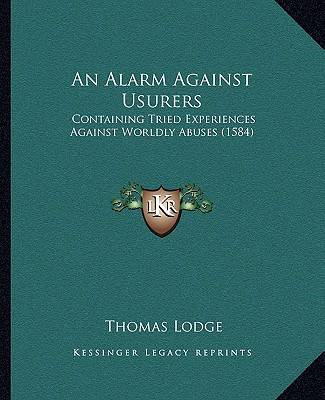
- Afhalen na 1 uur in een winkel met voorraad
- Gratis thuislevering in België vanaf € 30
- Ruim aanbod met 7 miljoen producten
- Afhalen na 1 uur in een winkel met voorraad
- Gratis thuislevering in België vanaf € 30
- Ruim aanbod met 7 miljoen producten
Zoeken
An Alarm Against Usurers
Containing Tried Experiences Against Worldly Abuses (1584)
Thomas Lodge
Paperback | Engels
€ 28,45
+ 56 punten
Uitvoering
Omschrijving
""An Alarm Against Usurers"" is a book written by Thomas Lodge in 1584. The book contains a collection of tried experiences against worldly abuses, specifically focusing on the issue of usury. Usury is the practice of lending money at an exorbitant interest rate, which was a common practice during the time in which the book was written. Lodge's book is a warning against the dangers of usury, and it provides practical advice on how to avoid falling into debt and becoming a victim of usurers. The book is divided into three sections, each of which focuses on a different aspect of the issue. The first section provides an overview of the problem of usury and its effects on society. The second section contains a series of personal anecdotes and experiences, which illustrate the ways in which usurers prey on the vulnerable and the poor. The third section offers practical advice on how to avoid falling into debt and becoming a victim of usury.Overall, ""An Alarm Against Usurers"" is a powerful critique of the practice of usury and its harmful effects on society. It is a valuable historical document that sheds light on the economic and social conditions of the time, and it remains relevant today as a warning against the dangers of debt and financial exploitation.This scarce antiquarian book is a facsimile reprint of the old original and may contain some imperfections such as library marks and notations. Because we believe this work is culturally important, we have made it available as part of our commitment for protecting, preserving, and promoting the world's literature in affordable, high quality, modern editions, that are true to their original work.
Specificaties
Betrokkenen
- Auteur(s):
- Uitgeverij:
Inhoud
- Aantal bladzijden:
- 96
- Taal:
- Engels
Eigenschappen
- Productcode (EAN):
- 9781167178122
- Verschijningsdatum:
- 10/09/2010
- Uitvoering:
- Paperback
- Formaat:
- Trade paperback (VS)
- Afmetingen:
- 190 mm x 235 mm
- Gewicht:
- 181 g

Alleen bij Standaard Boekhandel
+ 56 punten op je klantenkaart van Standaard Boekhandel
Beoordelingen
We publiceren alleen reviews die voldoen aan de voorwaarden voor reviews. Bekijk onze voorwaarden voor reviews.











